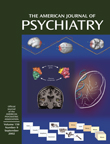Paternal Age and Risk of Schizophrenia in Adult Offspring
Abstract
OBJECTIVE: The study examined the relation between paternal age at the time of birth and risk of schizophrenia in the adult offspring. METHOD: Data from the birth cohort of the Prenatal Determinants of Schizophrenia study were used in this study. Virtually all members of this birth cohort had prospective information about paternal age at the time of the offspring’s birth. Subjects with schizophrenia and other schizophrenia spectrum disorders (N=71) among members of this birth cohort were previously ascertained. In separate analyses, paternal age was modeled as a continuous variable and as a categorical variable, and its relation with the risk of adult schizophrenia and other schizophrenia spectrum disorders and with the risk of schizophrenia separately were examined. RESULTS: There was a marginally significant, monotonic association between advancing paternal age and risk of adult schizophrenia and schizophrenia spectrum disorders. The association held after the analysis controlled for the effects of maternal age and other potential confounders. Similar results were observed when only subjects with schizophrenia were included in the analysis. CONCLUSIONS: Advanced paternal age at the time of birth of the offspring may be a risk factor for adult schizophrenia.



